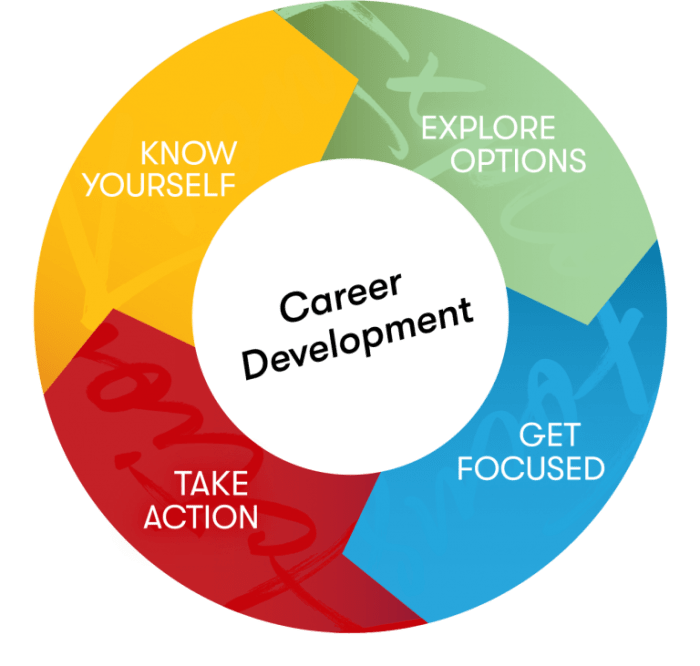Career Growth Strategies takes center stage in the professional world, offering a roadmap to success through strategic planning and skill development. Get ready to dive into the realm of personal and professional growth with these essential tips and insights.
Career Growth Strategies

Career growth strategies refer to the various plans and actions individuals can take to advance in their careers, achieve their professional goals, and reach new heights in their chosen field.
Examples of Effective Career Growth Strategies
- Continuous Learning: Investing in acquiring new skills and knowledge through courses, workshops, or certifications to stay relevant in a rapidly changing job market.
- Mentorship: Seeking guidance and advice from experienced professionals in your field to gain insights, networking opportunities, and career direction.
- Setting Clear Goals: Establishing specific and measurable career objectives to stay focused, motivated, and track progress towards achieving them.
- Networking: Building and maintaining relationships with colleagues, industry peers, and key stakeholders to expand opportunities, gather insights, and support career advancement.
Importance of Having a Well-Defined Career Growth Plan
A well-defined career growth plan is crucial for individuals to navigate their professional journey effectively and make informed decisions that align with their long-term aspirations. It provides clarity, direction, and a roadmap to success, helping individuals identify opportunities, overcome challenges, and achieve their career goals with purpose and confidence.
Setting Clear Goals
Setting clear, achievable goals is crucial for career growth as it provides a roadmap for success and helps individuals stay focused and motivated. By having specific targets to work towards, professionals can track their progress, make necessary adjustments, and ultimately reach their desired level of success.
Tips for Setting SMART Goals
- Specific: Clearly define what you want to achieve in your career. Avoid vague goals like “get better at my job.” Instead, set a specific target like “increase sales by 15% in the next quarter.”
- Measurable: Make sure your goals are quantifiable so you can track your progress. Use metrics like revenue, number of clients, or certifications earned to measure success.
- Achievable: Set goals that are challenging but realistic. Push yourself outside your comfort zone, but ensure your goals are attainable with effort and dedication.
- Relevant: Align your goals with your career aspirations and the overall direction of your organization. Make sure they contribute to your professional growth and the success of the company.
- Time-bound: Establish a clear timeline for achieving your goals. Set deadlines to create a sense of urgency and hold yourself accountable.
Benefits of Aligning Personal and Organizational Goals
- Increased Motivation: When personal goals are aligned with organizational objectives, employees are more motivated to perform at their best as they see a direct correlation between their efforts and the success of the company.
- Improved Performance: Setting goals that complement each other leads to improved performance as individuals are working towards common objectives, fostering teamwork and collaboration.
- Career Advancement: Aligning personal goals with organizational goals can open up opportunities for career advancement and professional development within the company.
- Enhanced Job Satisfaction: Achieving goals that benefit both personal growth and the organization’s success can lead to greater job satisfaction and a sense of fulfillment in one’s career.
Skill Development
In today’s fast-paced work environment, continuous skill development is crucial for career growth. Employers value individuals who are constantly learning and improving their skill set to stay competitive in the job market.
Identifying Skills Gaps
One way to identify skills gaps is to assess your current job responsibilities and compare them to the skills required for your desired career path. You can also seek feedback from supervisors, colleagues, or mentors to pinpoint areas where you can improve.
- Take online assessments or quizzes to evaluate your strengths and weaknesses.
- Attend workshops, conferences, or seminars to learn about new trends and technologies in your field.
- Networking with professionals in your industry can provide insights into the skills needed for career advancement.
Acquiring New Skills, Career Growth Strategies
Acquiring new skills can be done through various resources and methods to help you advance in your career.
Online courses from platforms like Coursera, Udemy, or LinkedIn Learning can help you learn new skills at your own pace.
- Enroll in certification programs or professional development courses relevant to your field.
- Join industry-specific associations or groups to gain access to training and workshops.
- Seek mentorship from experienced professionals who can guide you on skill development opportunities.
Networking: Career Growth Strategies
Networking plays a crucial role in career growth as it allows individuals to connect with professionals in their field, expand their knowledge, and open doors to new opportunities. Building and maintaining a strong professional network is essential for advancing in one’s career and staying competitive in the job market.
Strategies for Building and Maintaining a Strong Professional Network
- Attend networking events: Join industry-related conferences, seminars, and workshops to meet like-minded professionals and expand your network.
- Utilize social media: Connect with professionals on platforms like LinkedIn, Twitter, and Facebook to stay in touch and build relationships online.
- Volunteer or join professional organizations: Get involved in community service or industry associations to meet new people and showcase your skills and expertise.
- Offer help and support: Be willing to assist others in your network and provide value to build lasting relationships.
Networking for New Opportunities and Career Advancements
Networking can lead to new job opportunities, promotions, and career advancements by tapping into the hidden job market and gaining referrals from your connections. By connecting with professionals in your industry, you can stay informed about upcoming opportunities, gain insights into different career paths, and receive mentorship and guidance to navigate your career journey effectively.
Personal Branding

Personal branding is the image and reputation that you create for yourself in the professional world. It involves showcasing your unique skills, strengths, and values to stand out from others in your field. Your personal brand is what sets you apart and helps you make a lasting impression on employers, colleagues, and industry professionals.
Tips for Building a Strong Personal Brand
- Identify your strengths and values: Take time to reflect on what makes you unique and what you have to offer in your field.
- Create a consistent online presence: Use social media platforms like LinkedIn to showcase your expertise and connect with others in your industry.
- Network strategically: Build relationships with professionals in your field, attend industry events, and seek mentorship opportunities.
- Showcase your work: Share your accomplishments, projects, and experiences to demonstrate your skills and expertise.
- Seek feedback: Ask for constructive feedback from mentors, colleagues, and supervisors to continuously improve and refine your personal brand.
Importance of a Strong Personal Brand
A strong personal brand can enhance your career prospects and open up new opportunities in your professional life. Employers are more likely to notice and remember you when your personal brand is well-defined and consistent. It can also help you attract new clients, job offers, and collaborations within your industry. By building a strong personal brand, you position yourself as an expert in your field and increase your credibility and visibility among your peers.
